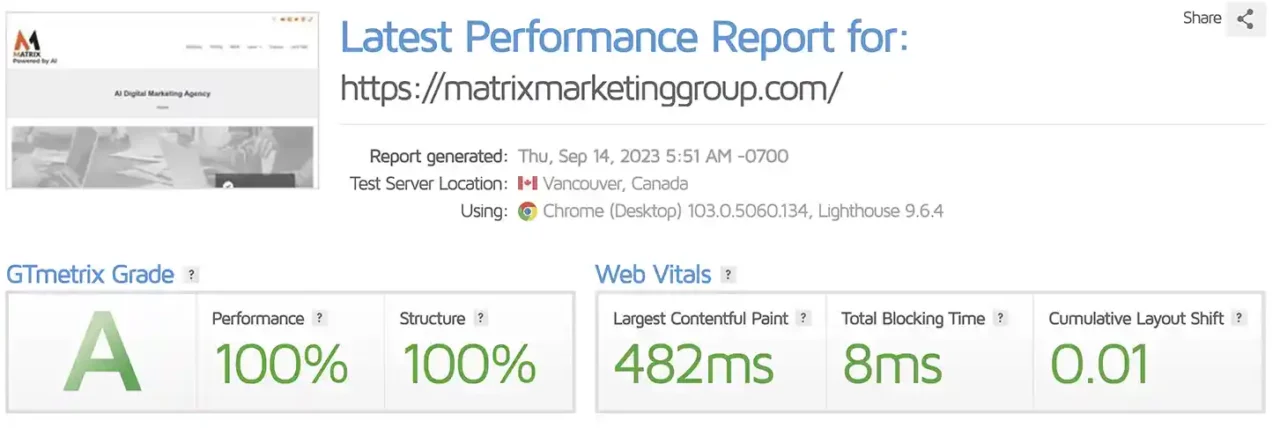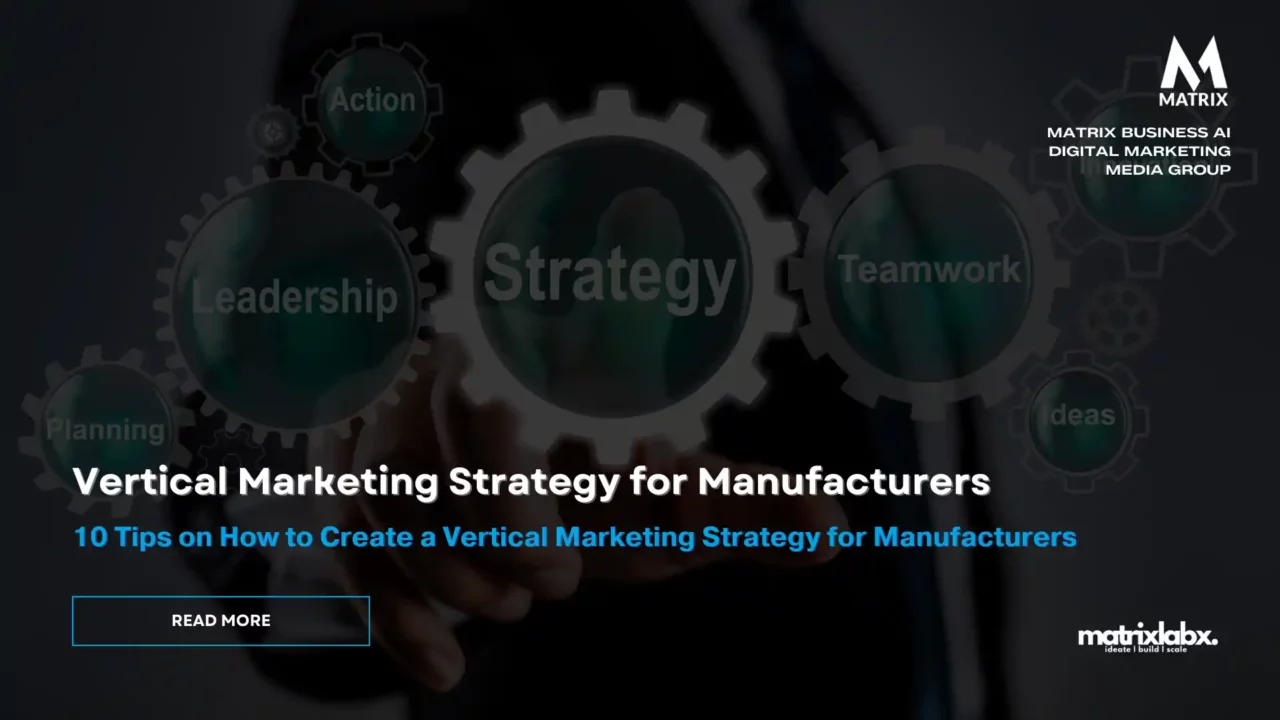10 Tips on How to Create a Vertical Marketing Strategy
Steal these 10 Tips on Creating a Vertical Marketing Strategy for Manufacturers and watch sales soar.
I see too many brands going too wide and too early with whitewashed content.
Vertical marketing is a strategy for selling products or services to customers in a specific industry or market segment.
This type of marketing approach allows businesses to tailor their products and services to meet the specific needs of their target market, which can result in increased sales and profits.
Once a target customer is engaged, move to a new sales approach called Provocation-based Selling.
Vertical marketing is a strategy that allows businesses to tailor their products and services to meet the specific needs of their target market, which can increase sales and profits.
Once a target customer is engaged, move to the new sales approach called Provocation-based Selling. This unique selling method uses provocative questions and statements to attract customers to your product or service.
Vertical marketing and horizontal marketing are two strategies businesses use for marketing efforts. In vertical marketing, a company uses one product or strategy to target multiple markets, while in horizontal marketing, the same product or strategy is used across all markets.
Vertical marketing can benefit companies with limited resources. It allows them to focus on one market and maximize their return on investment.
Vertical marketing can create brand loyalty in a specific market. Horizontal marketing, on the other hand, is best suited for companies with larger resources and greater reach. This strategy allows companies to target multiple markets at once and create a unified message across all of them.
Companies should consider their target market, budget, resources, and capabilities when developing a vertical market strategy. Vertical marketing also requires a more tailored approach to meet the needs of each market. For example, suppose a company is targeting multiple countries.
In that case, it may need to create separate campaigns for each that speaks to its citizens’ language, culture, and buying habits.
AI digital marketing is taking hold in the industry, and we’ve covered AI. AI can enhance traditional marketing strategies, allowing marketers to analyze and optimize campaigns in never-before-seen ways.
At Matrix Marketing Group, we use AI-driven technology and advanced analytics to help identify opportunities for better ad and content targeting, create more effective messaging, and provide insights into customer trends.
With this new sales technique, you can close more deals and increase your bottom line. Learn how to use provocation-based selling today by clicking on our website! PPC Digital Benchmarks by Industry
What is vertical marketing, and why is it important for businesses today

Vertical marketing is a strategy that focuses on selling products or services to customers in a specific industry or market segment.
This type of marketing approach allows businesses to tailor their products and services to meet the specific needs of their target market, which can result in increased sales and profits.
Vertical marketing is important for businesses today because it allows them to focus on a specific target market and tailor their products and services to meet their needs. This can result in increased sales and profits for the business. In addition, using a provocation-based selling technique can help close more deals and increase your bottom line.
Consider using vertical marketing and provocation-based selling to increase your sales and profits. These techniques can help you reach your target market and close more sales. For more information, visit our website today!
Google Ads Checklist – Download Now! 🚀
Struggling to get the most out of your Google Ads? 🔥 Download our Google Ads Optimization Checklist and take your campaigns to the next level!
✅ Maximize Clicks & Conversions
✅ Lower Your Cost-Per-Click (CPC)
✅ Improve Ad Quality Scores
✅ Target the Right Audience
This free checklist will help you set up, optimize, and scale your Google Ads campaigns for maximum ROI.
There are several different industry verticals, each with unique characteristics.
The most common industry verticals include manufacturing, healthcare, retail, and financial services.
Others include technology, media, and telecommunications.
Each industry vertical has its own set of challenges and opportunities.
For example, manufacturers must deal with supply chain management and product development issues, and healthcare organizations must navigate the complex world of insurance reimbursement.
Retailers must contend with ever-changing consumer tastes. And financial services firms must manage risk while also trying to grow their business.
As industries continue to evolve, new industry verticals are likely to emerge, so the list of industry verticals is always changing. Top 7 Challenges Facing SEO Managers in 2025
What is a vertical market?
A vertical market is a market in which businesses tailor their products and services to meet the specific needs of their target market.
This marketing approach allows businesses to penetrate their target market more easily, as they will be more familiar with your products and services.
Focusing on a specific market segment can help you better understand their needs and wants, giving you a competitive advantage.
What is the difference between a vertical market and a horizontal market?
A vertical market is a market in which businesses tailor their products and services to meet the specific needs of their target market.
A horizontal market is a market in which businesses sell their products or services to anyone, regardless of their industry or market segment.
What is the difference between a niche market and a vertical market?
A niche market is a small, specific market that has unique needs.
A vertical market is a market in which businesses tailor their products and services to meet the specific needs of their target market. Vertical vs. horizontal marketing will determine if you are developing a vertical or horizontal marketing strategy.
What problems does vertical marketing solve?

Vertical marketing is a strategy that allows businesses to tailor their products and services to meet the specific needs of their target market, which can result in increased sales and profits.
This marketing approach is important for businesses today because it allows them to focus on a specific target market and tailor their products and services to meet their needs.
This can result in increased sales and profits for the business. In addition, using a provocation-based selling technique can help close more deals and increase your bottom line.
Consider using vertical marketing and provocation-based selling to increase your sales and profits. These techniques can help you reach your target market and close more sales. For more information, visit our website today!




How can vertical marketing help your business?
Vertical marketing is a strategy for selling products or services to customers in a specific industry or market segment.
This type of marketing approach allows businesses to tailor their products and services to meet the specific needs of their target market, which can result in increased sales and profits.
One of the benefits of vertical marketing is that it allows businesses to build relationships with their target customers. Below are some examples of B2B vertical markets.
Businesses can become known as experts in their field by creating products and services tailored to meet the needs of their industry or market segment. Customers who know and understand a business’s needs are likelier to trust and buy from them.
Vertical marketing can also help businesses to stand out from their competitors. By targeting a specific industry or market segment, businesses can focus their marketing efforts on creating unique products and services that appeal to their target customers. This can help them differentiate themselves from the competition and attract new customers.
Finally, vertical marketing can be an effective way to increase sales and profits. By focusing on a specific industry or market segment, businesses can create products and services that are relevant and appealing to their target customers. This can lead to increased sales and a higher ROI for your programs.
The benefits of using vertical marketing

There are many benefits to using vertical marketing, including the following:
- increased sales and profits
- better customer relationships
- more unique products and services
- reduction in cost to market
Vertical marketing allows businesses to focus on a specific target market and tailor their products and services to meet their needs.
This can result in increased sales and profits for the business. In addition, using a provocation-based selling technique can help close more deals and increase your bottom line.
If you want to increase your sales and profits, consider using vertical marketing. This marketing approach can help you reach your target market and close more sales. For more information, visit our website today!
What you need to know about vertical marketing

Vertical marketing is a strategy that allows businesses to tailor their products and services to meet the specific needs of their target market, which can increase sales and profits.
To make vertical marketing work for your business, it’s important to understand the following:
- What industries or market segments are you targeting? When creating a vertical marketing plan, you must focus on specific industries or market segments. This will help you create products and services that are relevant and appealing to your target customers.
- What are your target customers’ needs? You must understand their needs to create products and services that appeal to them. When you know your target market’s needs, you can create products and services that address those needs.
- What are your competitive advantages? When competing in a specific industry or market segment, it’s important to have a competitive advantage. This could be anything from having unique products or services to being the lowest-cost provider in the market. When you know your competitive advantages, you can focus your marketing efforts on highlighting them.
- What is your brand identity? Your brand identity is how your customers perceive you. When you’re creating a vertical marketing technique, it’s important to think about how you want to be perceived by your target market. Do you want to be the expert in your field or have the best customer service? Once you know how you want to be perceived, you can focus your marketing efforts on conveying that message.
- When creating a vertical marketing system, it’s important to consider your budget. This will help you determine what type of marketing activities you can undertake. If you have a limited budget, you may need to focus on more cost-effective marketing activities such as online marketing.
If you’re looking to create a vertical marketing strategy for your business, consider the following tips:
- Focus on specific industries or market segments you want to target.
- Understand the needs of your target customers.
- Identify your competitive advantages.
- Consider your brand identity.
- Set a budget for your marketing activities.
Following these tips, you can create a vertical marketing approach to help you reach your target market and increase sales.
Why you should use vertical marketing

Vertical marketing is a great way to focus your products and services on a specific industry or market segment. By tailoring your offerings to meet the specific needs of your target market, you can increase sales and profits.
Additionally, vertical marketing can help you build stronger customer relationships, as customers will know you understand their industry and needs.
There are a few key benefits to using vertical marketing:
- Increased Sales and Profits – Focusing your products and services on a specific industry or market segment allows you to tailor them to meet the specific needs of your target market. This can increase sales and profits, as customers will be more likely to purchase products specifically designed for their needs.
- Stronger Customer Relationships – When using vertical marketing, customers will know you understand their industry and needs. This can lead to stronger customer relationships, as customers will appreciate your taking the time to understand their business.
- Easier Communication – Targeting a specific industry or market segment makes communicating with your target customers easier. This makes selling them products and services easier, as you will speak their language and address their needs.
If you want to grow your business, vertical marketing should be part of your strategy. Vertical marketing is a great way to focus your business on a specific industry or market segment. Doing so can increase sales and profits, build stronger customer relationships, and simplify communication with your target customers.
Repurpose some of the content above to create an enticing meta description:
Is your business ready to expand its marketing strategy? Vertical marketing may be the answer to increase sales and profits while strengthening customer relationships.
Learn more about the benefits of vertical marketing and how it can help your business grow. See the vertical marketing strategy example next.
5 case studies and results of vertical marketing have been used successfully

1. Audi Beverley Hills uses vertical marketing to focus on the needs of its customers in the automotive industry. Thanks to its customized products and services, ABC has seen a significant increase in sales and profits.
2. Ohmeda Corporation has used vertical marketing greatly in the medical industry. Thanks to its customized products and services, Ohmeda has seen a significant increase in sales and profits for its medical devices.
3. TrackVia again uses vertical marketing, focusing on the needs of its technology industry customers.
TrackVia used content marketing, landing pages, graphic design, SEO, and copywriting with the following results:
- 483% increase in organic sessions
- 168% Increase in Marketing Qualified Leads (MQL)
- 107% Increase in Sales Qualified Leads (SQL)
- HubSpot CRM and marketing automation platform
- Comprehensive inbound digital marketing strategy
4. Natural Retreat (Hospitality and Travel Industry) expands its use of vertical marketing to include the hospitality industry in demographics and lifestyle. Thanks to its tailored real estate holdings and services, Natural Retreat has seen a significant increase in sales and profits.
Natural Retreat used content marketing, SEO, online advertising, social advertising, and social media management with the following results:
- 701% of website visits from email marketing
- Return On Ad Spend (ROAS) increased by 78%
- 63% decrease in the cost of customer acquisition
5. Core Capital Partners (financial services). Core Capital Partners used content marketing, landing pages, website design, and SEO.
- Comprehensive digital marketing strategy
- 783% increase in organic sessions
- 147% Increase in Marketing Qualified Leads (MQL)
- 121% Increase in Sales Qualified Leads (SQL)
Tips on how to implement a successful vertical marketing campaign

Vertical marketing can be a great way to focus your business on a specific industry or market segment. However, you must implement a successful campaign before you can reap the benefits of vertical marketing.
Here are some tips on how to do just that:
- Tailor your products and services to meet the specific needs of your target market.
- Speak the language of your target customers and address their needs.
- Use content marketing to educate your target customers about your products and services.
- Utilize digital marketing tools and tactics to reach your target customers online.
- Evaluate the results of your campaign and make necessary adjustments. The importance of customer feedback when using a vertical marketing approach.
- Use your HubSpot Service Hub to gather information about your products’ friction and eliminate it. Look closely at your customer service interactions and see where you can reduce support issues.
- Create a system to rate customers’ experience with your company and product.
- Make it easy for customers to give you feedback on their experience.
- Encourage employees to take part in the vertical marketing technique.
- Measure the results of the campaign and adjust as needed.
The benefits of vertical marketing A successful vertical marketing campaign can provide numerous benefits for your business.
Customer feedback is essential when using vertical marketing tactics. By understanding the needs and wants of your target customers, you can tailor your products and services to meet their specific needs. This can be done through surveys, focus groups, or simply listening to customer feedback.
It’s also important to constantly evaluate your campaign’s results and make necessary adjustments. This helps ensure that your products and services are still meeting the needs of your target market. Customer feedback can help you make these necessary adjustments.
The HubSpot Service Hub can be a valuable tool for gathering information about customer feedback. With its built-in survey tool, you can easily gather customer feedback about their experience with your products and services. This information can help you identify areas where your products have friction and need improvement.
The Future of vertical marketing and how businesses can stay ahead of the Curve

Vertical marketing is a great way to focus your business on a specific industry or market segment. However, you must constantly innovate and evolve your approach to stay ahead of the curve. Here are some tips on how to do just that:
- Keep up with the latest trends in your industry.
- Use cutting-edge HubSpot technology to reach your target customers.
- Evolve your content marketing strategy to keep up with changing trends with Matrix Marketing Group.
- Stay ahead of the competition by constantly innovating and evolving your approach.
By following these tips, you can ensure that your business stays ahead of the curve in the ever-changing world of vertical marketing.
Conclusion on Vertical Marketing Strategy
Vertical marketing can be a great way to focus your business on a specific industry or market segment. However, it would be best to implement a successful campaign before reaping the benefits of vertical marketing.
Tailor your products and services to meet the specific needs of your target market. Speak the language of your target customers and address their needs.
Use content marketing to educate your target customers about your products and services. Utilize digital marketing tools and tactics to reach your target customers online. Evaluate the results of your campaign and make necessary adjustments.
Affordable SEO Solutions That Drive Real Results
Matrix Marketing Group Delivers Customized SEO Strategies with Transparent Pricing for Maximum ROI. See SEO Services.
General FAQs about Vertical Marketing Strategy
What is a vertical marketing strategy?

Vertical marketing is a strategy that focuses on selling products or services to customers in a specific industry or market segment. This type of marketing approach allows businesses to tailor their products and services to meet the specific needs of their target market, which can result in increased sales and profits.
What are the benefits of using a vertical marketing strategy?

There are many benefits to using a vertical marketing strategy, including (1) Tailoring products and services to meet the specific needs of your target market can result in increased sales and profits, and (2) You can more easily penetrate your target market, as they will be more familiar with your products and services, and (3) Focusing on a specific market segment can help you better understand their needs and wants, which can give you a competitive advantage.
How can businesses use a vertical marketing strategy to increase sales and profits?

There are many ways businesses can use a vertical marketing strategy to increase sales and profits, including (1) tailoring products and services to meet the specific needs of your target market and (2) focusing on a specific market segment that is familiar with your products and services, and (3) understanding the needs and wants of your target market so you can better meet their needs.
What industries or market segments most likely benefit from a vertical marketing strategy?

Industries and market segments that are most likely to benefit from a vertical marketing strategy are those that have a lot of competition, those that are cyclical, and those that have a lot of regulatory compliance.

